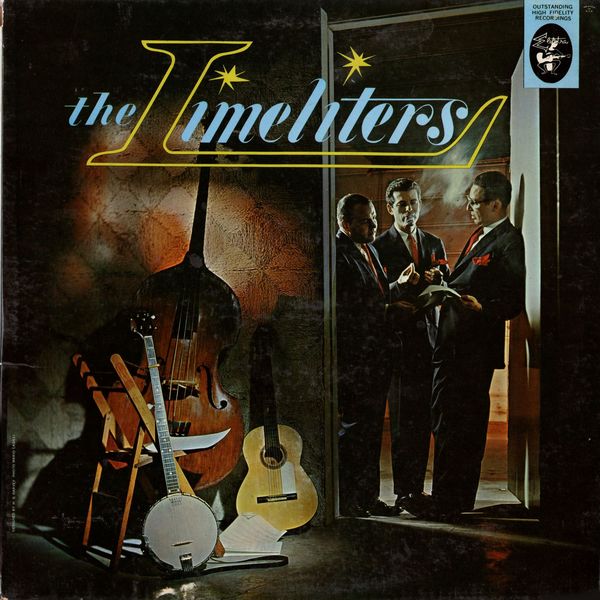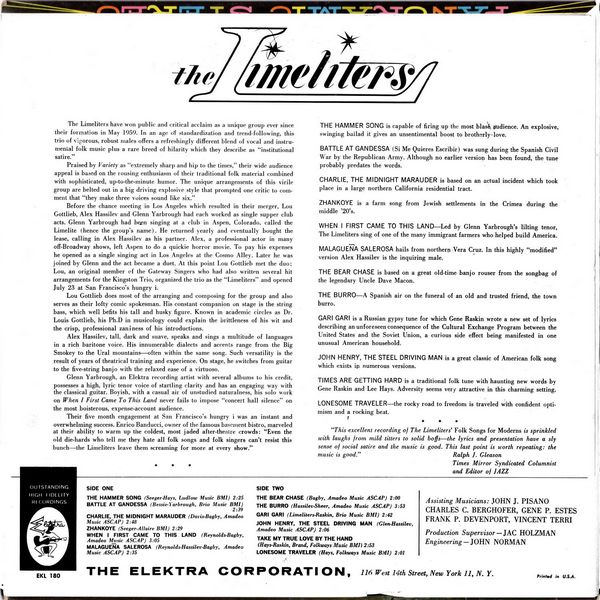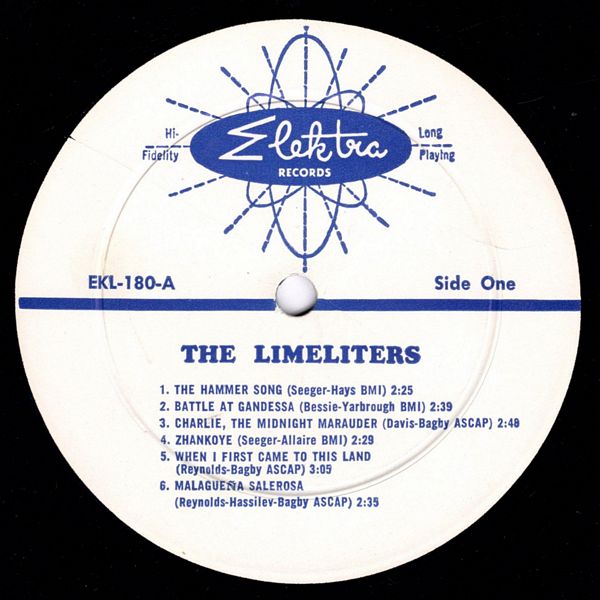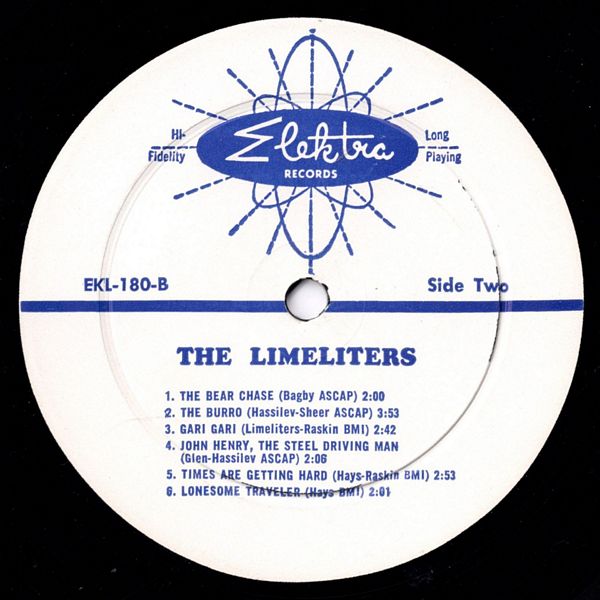
 |


 |
Sleeve Notes
The Limeliters have won public and critical acclaim as a unique group ever since their formation in May 1959. In an age of standardization and trend-following, this trio of vigorous, robust males offers a refreshingly different blend of vocal and instrumental folk music plus a rare breed of hilarity which they describe as "institutional satire."
Praised by Variety as "extremely sharp and hip to the times," their wide audience appeal is based on the rousing enthusiasm of their traditional folk material combined with sophisticated, up-to-the-minute humor. The unique arrangements of this virile group are belted out in a big driving explosive style that prompted one critic to comment that "they make three voices sound like six."
Before the chance meeting in Los Angeles which resulted in their merger, Lou Gottlieb, Alex Hassilev and Glenn Yarbrough had each worked as single supper club acts. Glenn Yarbrough had been singing at a club in Aspen, Colorado, called the Limelite (hence the group's name). He returned yearly and eventually bought the lease, calling in Alex Hassilev as his partner. Alex, a professional actor in many off-Broadway shows, left Aspen to do a quickie horror movie. To pay his expenses he opened as a single singing act in Los Angeles at the Cosmo Alley. Later he was joined by Glenn and the act became a duet. At this point Lou Gottlieb met the duo; Lou, an original member of the Gateway Singers who had also written several hit arrangements for the Kingston Trio, organized the trio as the "Limeliters" and opened July 23 at San Francisco's hungry i.
Lou Gottlieb does most of the arranging and composing for the group and also serves as their lofty comic spokesman. His constant companion on stage is the string bass, which well befits his tall and husky figure. Known in academic circles as Dr. Louis Gottlieb, his Ph.D in musicology could explain the brittleness of his wit and the crisp, professional zaniness of his introductions.
Alex Hassilev, tall, dark and suave, speaks and sings a multitude of languages in a rich baritone voice. His innumerable dialects and accents range from the Big Smokey to the Ural mountains — often within the same song. Such versatility is the result of years of theatrical training and experience. On stage, he switches from guitar to the five-string banjo with the relaxed ease of a virtuoso.
Glenn Yarbrough, an Elektra recording artist with several albums to his credit, possesses a high, lyric tenor voice of startling clarity and has an engaging way with the classical guitar. Boyish, with a casual air of unstudied naturalness, his solo work on When I First Came To This Land never fails to impose "concert hall silence" on the most boisterous, expense-account audience.
Their five month engagement at San Francisco's hungry i was an instant and overwhelming success. Enrico Banducci, owner of the famous basement bistro, marveled at their ability to warm up the coldest, most jaded after-theatre crowds: "Even the old die-hards who tell me they hate all folk songs and folk singers can't resist this bunch — the Limeliters leave them screaming for more at every show."
The Hammer Song is capable of firing up the most blasé audience. An explosive, swinging ballad it gives an unsentimental boost to brotherly love.
Battle At Gandessa (Si Me Quieres Escribir) was sung during the Spanish Civil War by the Republican Army. Although no earlier version has been found, the tune probably predates the words.
Charlie, The Midnight Marauder is based on an actual incident which took place in a large northern California residential tract.
Zhankoye is a farm song from Jewish settlements in the Crimea during the middle '20's.
When I First Came To This Land — Led by Glenn Yarbrough's lilting tenor, The Limeliters sing of one of the many immigrant farmers who helped build America.
Malagueña Salerosa hails from northern Vera Cruz. In this highly "modified" version Alex Hassilev is the inquiring male.
The Bear Chase is based on a great old-time banjo rouser from the songbag of the legendary Uncle Dave Macon.
The Burro — A Spanish air on the funeral of an old and trusted friend, the town burro.
Gari Gari is a Russian gypsy tune for which Gene Raskin wrote a new set of lyrics describing an unforeseen consequence of the Cultural Exchange Program between the United States and the Soviet Union, a curious side effect being manifested in one unusual American household.
John Henry, The Steel Driving Man is a great classic of American folk song which exists ip numerous versions.
Times Are Getting Hard is a traditional folk tune with haunting new words by Gene Raskin and Lee Hays. Adversity seems very attractive in this charming setting.
Lonesome Traveler — the rocky road to freedom is traveled with confident optimism and a rocking beat.
"This excellent recording of The Limeliters' Folk Songs for Moderns is sprinkled with laughs from mild titters to solid hoffs — the lyrics and presentation have a sly sense of social satire and the music is good. This last point is worth repeating: the music is good"
Ralph J. Gleason
Times Mirror Syndicated Columnist and Editor of JAZZ